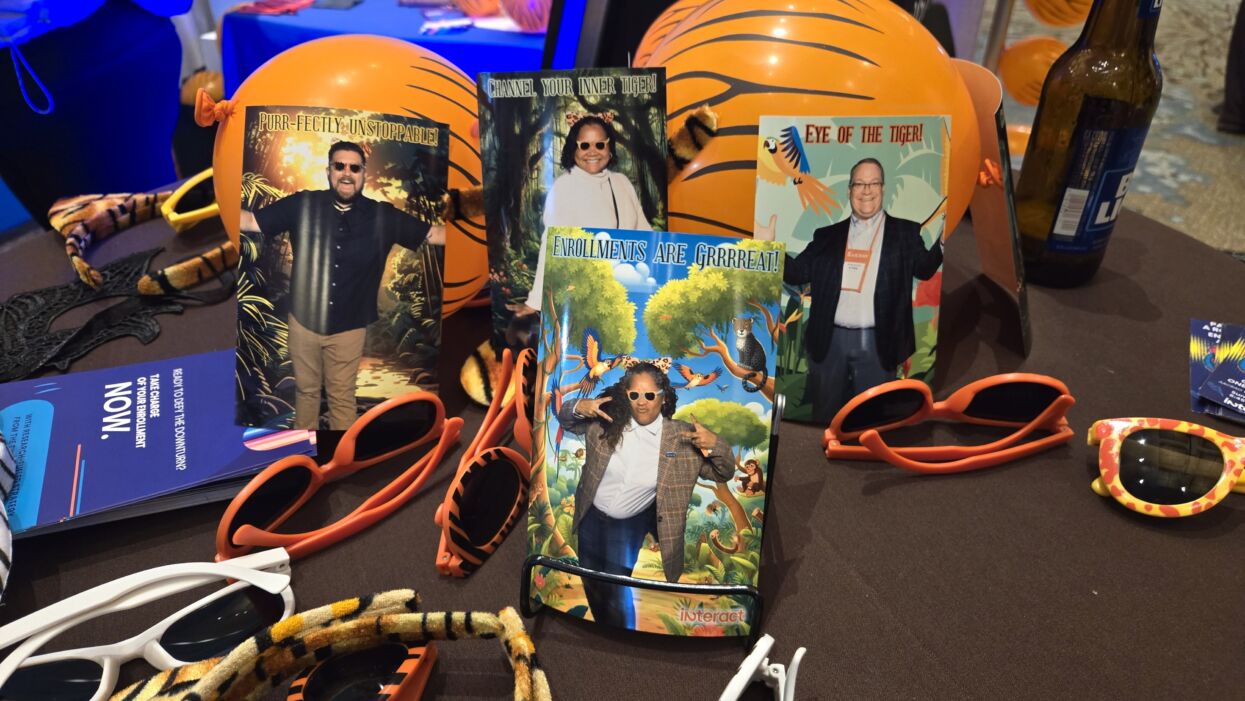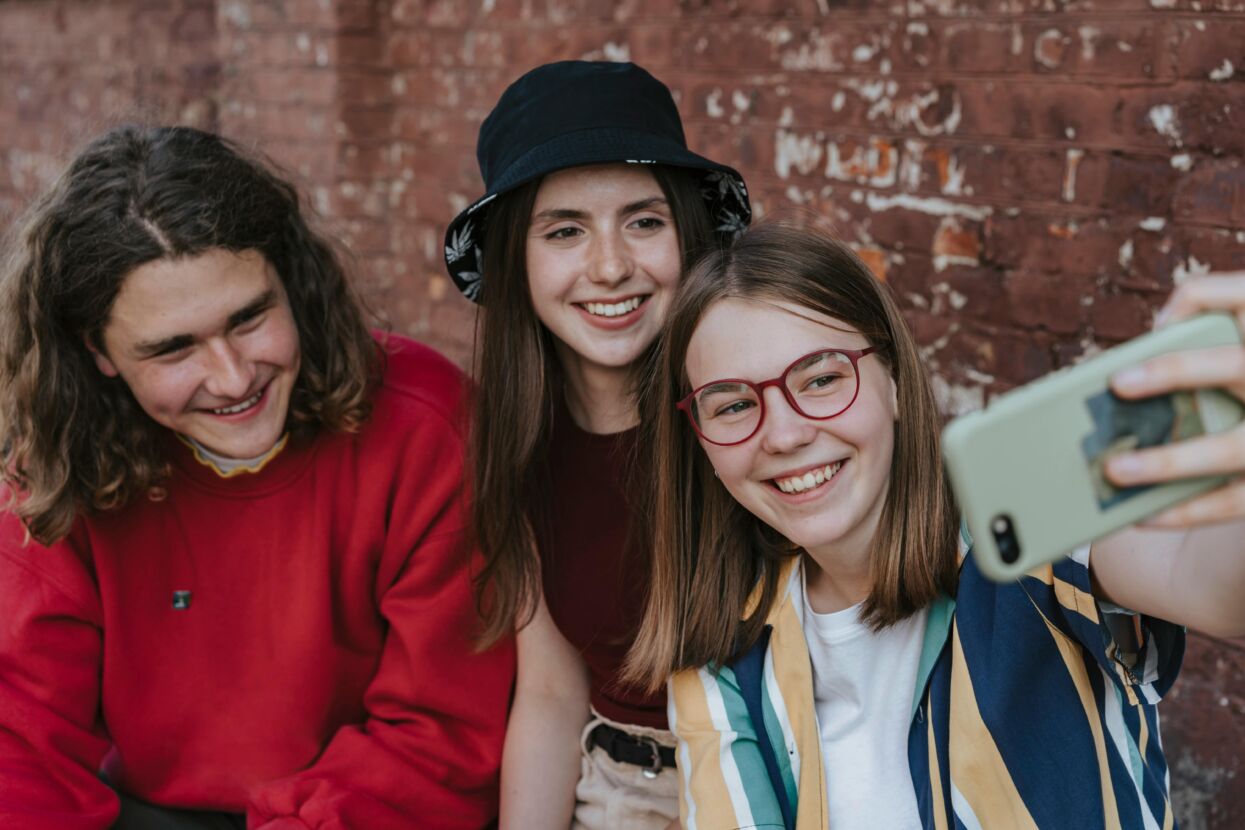What Is a Superhero?
- According to the Oxford Dictionary, a real person who has done something unusually brave to help somebody.
- According to the Cambridge Dictionary, a person whose actions or achievements are far greater than what people expect.
- According to Merriam-Webster, an exceptionally skillful person.
However you define a superhero, when it comes to higher education, community and technical colleges are superheroes. Since 1901, community colleges have literally helped millions discover and achieve their potential. Many of these students would never have attended college had it not been for the community college commitment for expanding education for all.
Community colleges are where everyday heroes guide aspirations into achievements. These open-door institutions meet students where they are and take them where they want to be. They are hope givers, opportunity shapers, and potential boosters.
No other sector of education does more to
- take in the needs of entire communities
- raise skills, education levels, and employment prospects
- for people of all educational and socioeconomic backgrounds.
Community colleges provide higher education to the students with the fewest resources and the greatest obstacles. These students who are more likely to be low-income, first-generation, and balancing both work and family demands.
As we at Interact like to say, community colleges lift up people who are often left behind. And, they do this with less government funding than their four-year counterparts. If that doesn’t qualify as deserving “superhero” status, I’m not sure what does.
Why Community Colleges Are Super
It’s April, National Community College Month, a 30-day window to brag about our community colleges and the contributions they make to the lives of students and to the community. This year, in the midst of this most challenging time, it seems fitting that we take a moment to thank these higher ed leaders who already:
- Save lives as our nation’s primary educators of nursing and other healthcare workers and public safety professionals
- Serve as innovators in science, technology, and other in-demand fields helping to jump-start economies during difficult economic times
- Provide essential academic, social, and cultural resources that enrich the lives of everyone in their community, from toddlers to seniors
Let’s give our community colleges the applause and the capes they deserve, perhaps now more than ever.
Community college students, faculty, and grads are on the front lines fighting COVID-19. Community colleges are also at the heart of local responses, donating laptops, medical equipment, facilities, and more.
As California Governor Gavin Newsom said during a March 24, 2020 press conference: “By some estimates, 70% of our first responders … are trained through the community college system and they’re doing heroic work in this state.”
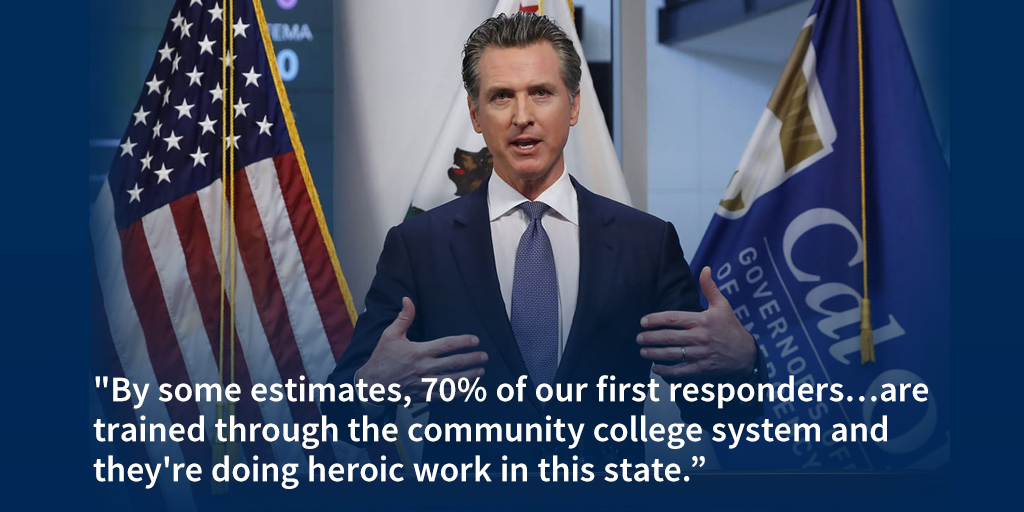
Walter Bumphus, president and CEO of the American Association of Community Colleges (AACC) shared similar praise, in a recent CC Daily article: “It is remarkable to see how the institutions that are preparing students to work in the healthcare field are stepping up to help their partners and communities during this crisis.”
In celebration of Community College Month, here are some shout-outs to the many community colleges that are lifting our communities coast to coast.
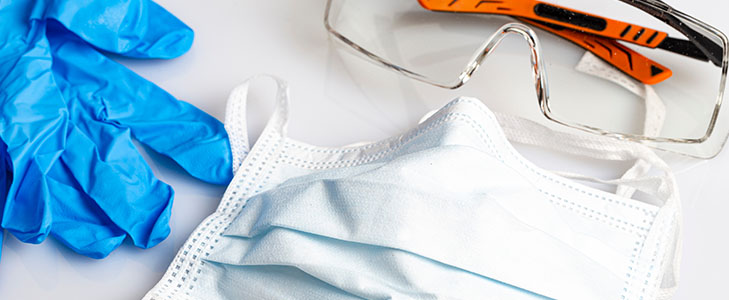
Healthcare Superheroes
Here’s to those providing critical care equipment to local healthcare workers and first responders in need. Community colleges like the following:
- New Jersey’s Middlesex County College, which donated personal protective equipment (PPE) from its nursing programs to Raritan Bay Medical Center and from its dental hygiene program to the Middlesex County Office of Emergency Management.
- Oregon’s Portland Community College, which collected nearly 12,000 PPE items for local hospitals.
- Finger Lakes Community College (New York), which had a nursing professor deliver three boxes of isolation gowns, 20 boxes of gloves, and 2.5 boxes of masks to FF Thompson Hospital.
- Galveston College in Texas, whose nursing department donated several boxes of masks and gowns back to the University of Texas Medical Branch (UTMB Health) that UTMB had donated to the college a few years ago. UTMB Health is the largest employer on Galveston Island and many students in its healthcare programs have clinical rotations at the university’s hospital and clinics.
- Glen Oakes Community College (Michigan), whose nursing and allied health department provided a total of 83 boxes of exam gloves, four boxes of sterile gloves, six cases of isolation gowns, four boxes of face masks, and four containers of chlorhexidine wipes to Revolution Health, Bronson Hospital, and Three Rivers Health.
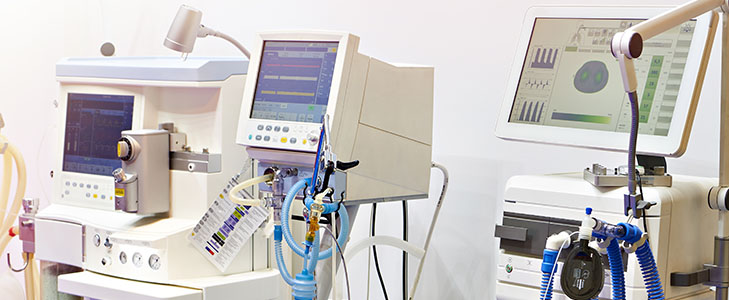
Providing Healthcare Equipment
Here’s to those providing ventilators and other medical equipment. Community colleges like the following:
- Lone Star College-Kingwood in Texas, which, according to the Houston Chronicle, is loaning eight ventilators, five nebulizers, and 75 personal protective equipment kits.
- Western Technical College in La Crosse, Wisconsin, which donated ventilators to Gundersen Health System and Mayo Clinic Health System hospitals, as well as medical supplies used to train students, to local first responders and health care providers.
- Orange Coast College (California), whose respiratory care program is loaning the college’s three ventilators to Saddleback Memorial Hospital, which also serves as a clinical site for OCC students.
- HACC, Central Pennsylvania’s Community College, which loaned ventilators and a BiPAP machine from its respiratory therapy program to Geisinger Health and Penn State Health.
- National Park College in Arkansas, which donated PPE from its nursing program and offered other equipment, such as respirators and beds, as well as space in its labs. National Park also volunteered to field calls for the local COVID-19 call center.
- Foothill College in Los Altos Hills, California, whose respiratory therapy program identified 12 ventilators, some of which are brand new, to loan to hospitals.
- Henry Ford College in Dearborn, Michigan, which has not only donated surgical technology equipment to a local hospital but which is also releasing certified healthcare professionals on its faculty to work or volunteer in essential healthcare settings.

Tech Heroes
Here’s to those putting innovation and technology to work to serve populations in need. Community colleges like the following:
- Community College of Baltimore County (CCBC), Maryland, where faculty and staff in the computer-automated manufacturing program and the college campus’s, community Fab Lab Baltimore are producing hundreds of laser-cut shields and face masks for the healthcare community and Baltimore’s homeless population. The college is partnering with Housing Our Neighbors (HON) to crowdsource the manufacturing of face masks to give to homeless shelters and camps. They are also working with a group called Helpful Engineering to turn the Fab Lab into a small production facility and are ramping up production to make several hundred face shields using the lab’s laser technology.
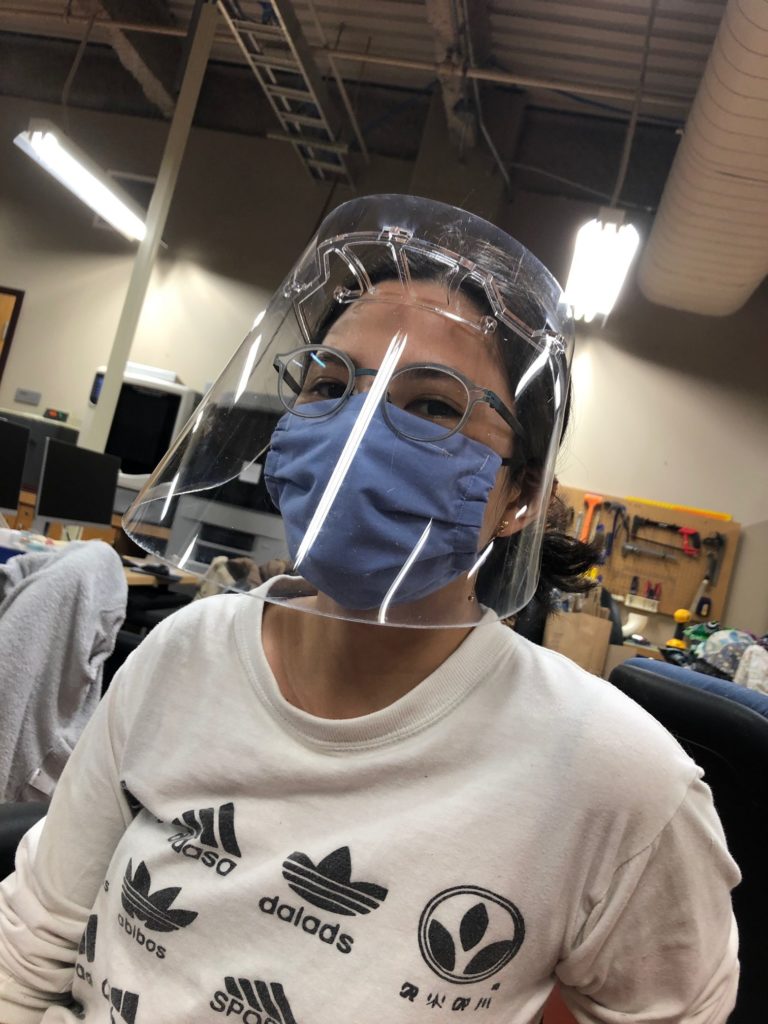
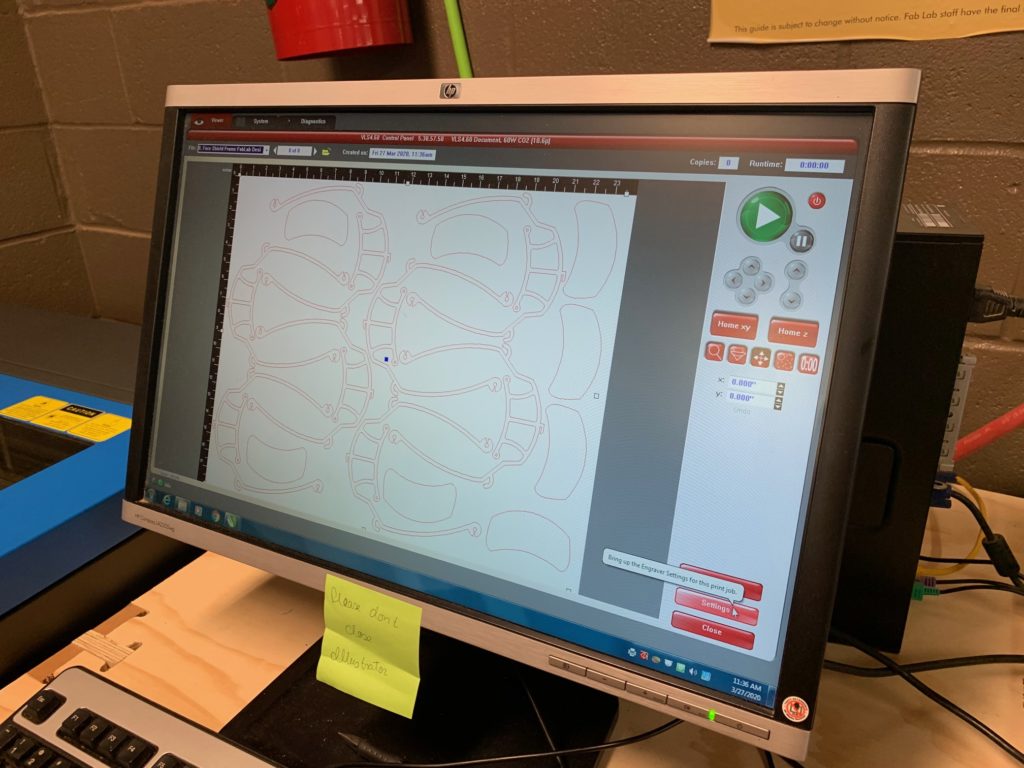
- Gulf Coast State College, Florida, which has partnered with Bay District Schools to create a series of 15-20 short science videos called “STEAMing Ahead in Science” that will air on the GCSC YouTube channel and be shared via the college’s youth programs’ social media page. The videos provide parents with hands-on, interactive science experiments they can conduct at home with their children with materials found around the house. It’s also an example of how community colleges partner with their K-12 colleagues to help local youth and their parents.
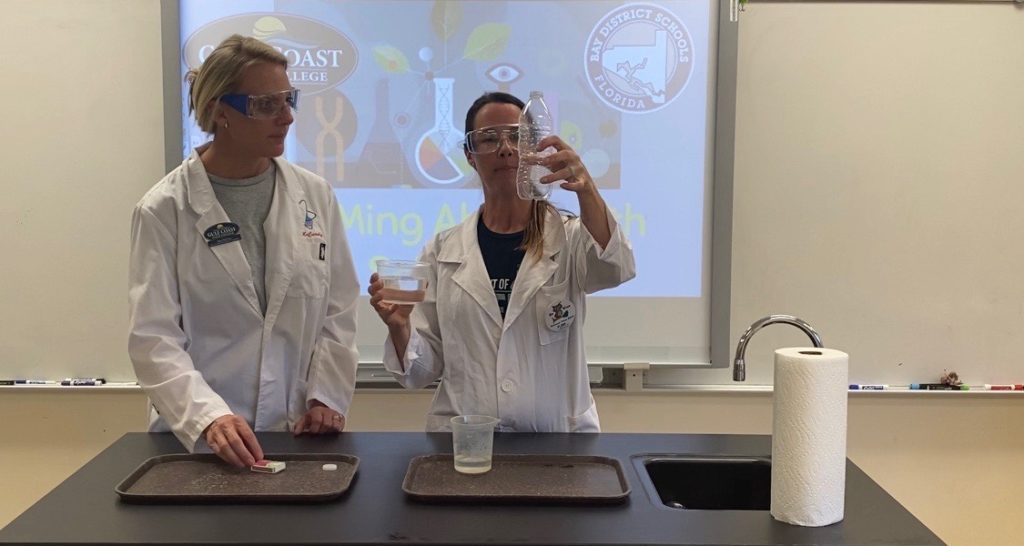
Katie McCurdy, executive director of community engagement, Gulf Coast State College, joins Erin Brack, Bay District Schools elementary science instructional coach to conduct a science experiment for the GCSC YouTube channel.
Laptops, Food, and More

Here’s to those giving laptops and food for those in need. Community colleges like:
- Chaffey College, for loaning 5,000 laptops to students this semester across its three campuses.
- The Los Angeles Community College District (LACCD) gave 3,000 laptops via a drive-up process. LACCD students simply register online and apply for a specific scholarship to qualify for the laptops. LACCD’s “Corona Kindness” event was even featured in the Good Morning America story, “Take a deep breath: Amid coronavirus crisis, good news is happening.”
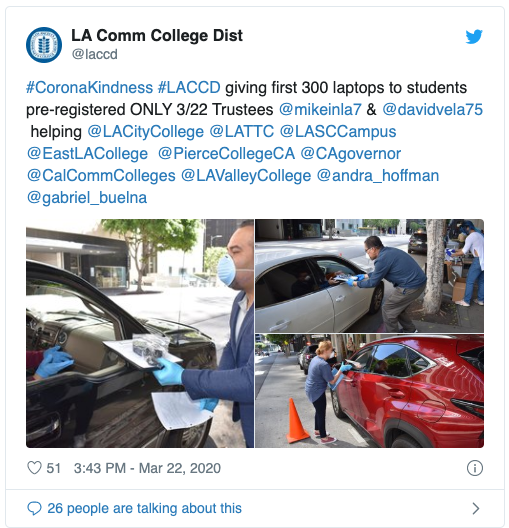
- Springfield Technical Community College in Massachusetts, which gave more than 500 Chromebooks and Hotspots (many donated by T-Mobile), and $2,500 in grocery gift cards (donated by Stop & Shop) to students while also donating all of its PPE to local hospitals, and turning its parking lot into a staging area to triage COVID-19 testing for a large, local homeless shelter.
- Palomar College, which, according to the San Diego Union-Tribune, distributed 344 computers, along with free food, to students before moving to alternative instruction.
- Mission College in the San Francisco Bay area, which, according to local news reports, is offering free on-the-go lunches to assist the needs of their student population. The students just show their ID cards to enjoy the free lunch.
- San Joaquin Delta College (California), which continues to provide its food pantry services with drive-up service.

- Bunker Hill Community College in Boston, which is keeping its DISH Food Pantry open, with reduced hours, encouraging students to order online for pickup.
Thank You, Community Colleges!
Now more than ever, you are showing us what it means to lead with compassion and innovation. We at Interact salute you. You continue to inspire us and our work. Happy Community College Month!

Sources for content shared in this blog include the following:
